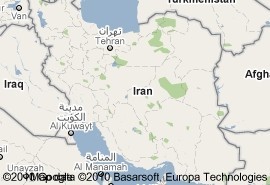PARIS (AP) -- European Union sanctions against Iran could be eased as soon as December, officials said Monday, after a potentially history-shaping deal that gives Tehran six months to increase access to its nuclear sites in exchange for keeping the core components of its uranium program.
The deal, announced Sunday, envisages lifting some of the sanctions that have been crippling the country's economy. The sanctions were in response to fears that Tehran is using its nuclear program to build atomic arms. Iran denies it wants such weapons.
"A Europe-wide decision is necessary" to ease EU sanctions, French Foreign Minister Laurent Fabius told Europe 1 radio. "That's expected in several weeks, for a partial lifting that is targeted, reversible."
"It could be in December, it could be in January, it depends on how long the legislative process takes," EU foreign affairs spokesman Michael Mann told reporters in Brussels.
The United States and the European Union have separate sanctions on Iran. Easing the European restrictions would affect numerous areas including trade in petrochemicals, gold and other precious metals, financial transfers to purchase food and medicine, and the ability of third countries to use EU-based firms to insure shipments of Iranian oil again.
Mann said work on amending the EU regulations was already beginning, but cautioned that changes depend on the Iranian government living up to its end of the deal.
"It's important that both sides of the bargain are implementing this agreement, so we would coordinate timing-wise also with the Iranian side," the EU spokesman said.
The deal reached Sunday will allow Iran to keep the central elements of its uranium program while stopping its enrichment at a level lower than what is needed for nuclear arms. In addition to a six-month window for Iran to allow more U.N. access to nuclear sites, sanctions will be eased - notably in the oil, automotive and aviation industries - though not ended.
The agreement is a first step - one that Israel has condemned as a "historic mistake" that effectively accepts Iran as a threshold nuclear weapons state. Israel has found common cause with Saudi Arabia, which shares concerns about a nuclear-armed Iran and Tehran's growing regional influence.
On his return to Tehran, Iranian Foreign Minister Mohammed Javad Zarif told state television that the country was prepared for quick follow-up negotiations to keep the deal on track.
"We are ready to begin the final stage of nuclear agreement from tomorrow," said Zarif, who was greeted by hundreds of cheering students.
Many Iranians appeared upbeat about the deal and the possibility of an eventual end to sanctions, such as blocks on access to international banking networks that have crippled businesses and made once-routine transactions - such as paying tuition for a student abroad - a complicated process.
But hard-line groups remained highly wary of any close cooperation with Washington.
An editorial in the conservative daily Kayhan described the U.S. as a deceitful power that could renege on its pledges even if Iran sticks with its part of the deal.
"The U.S. was not trustworthy. The Geneva deal lasted only one hour," it said in its front-page headline, referring to U.S. Secretary of State John Kerry's comments that there was no recognition of Iran's "right" to enrich uranium.
Iran insists that trying to block enrichment was a dead end. For Iran's leaders, self-sufficiency over the full scope of its nuclear efforts - from uranium mines to the centrifuges used in enrichment - is a source of national pride and a pillar of its self-proclaimed status as a technological beacon for the Islamic world.
In the end, Iran agreed to cap its enrichment level at 5 percent, far below the 90 percent threshold needed for a warhead. Iran also pledged to "neutralize" its stockpile of 20 percent enriched uranium - the highest level acknowledged by Tehran - by either diluting its strength or converting it to fuel for research reactors, which produced isotopes for medical treatments and other civilian uses.
In return, Iran got the rollback in some sanctions - a total package estimated by the White House at $7 billion back into the Iranian economy over six months - but the main pressures remain on Iran's oil exports and its blacklist from international banking networks during the first steps of the pact.
Thursday
April 18th, 2024
8:40PM









